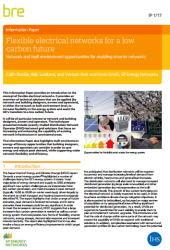Flexible electrical networks for a low carbon future: Network and built environment opportunities for enabling smarter networks
BRE (Building Research Establishment) is an independent, research-based consultancy, testing and training organisation, operating in the built environment and associated industries.
Flexible electrical networks for a low carbon future: Network and built environment opportunities for enabling smarter networks (IP 1/17) was written by Colin Sinclair, and published by BRE Scotland on 10 April 2017.
Equipment that delivers electricity to properties will need to be increasingly agile to meet energy demand requirements and assist in the transition to a low-carbon future. This will become crucial as low-carbon technology may increase peak network flows with surges in system voltage.
This information paper provides an introduction to the concept of flexible electrical networks. It offers an overview of technical solutions that can be applied by network and building designers, owners and operators, at either the network or built environment level, to increase flexibility in the energy system. It describes techniques tested in Scotland under the Flexible Networks for a Low Carbon Future project. It explains innovative technical solutions used to increase energy flexibility and to maintain network integrity and customer supply and service. This includes Distribution Network Operator (DNO)-led smart grid solutions that focus on increasing and enhancing the capability of existing network infrastructure in constrained areas.
The contents of the information paper are:
- Introduction.
- What is a flexible network?
- Enhanced network monitoring.
- Innovative techniques.
- Where to apply these techniques.
[edit] Find out more.
[edit] Related articles on Designing Buildings Wiki
- BRE articles on Designing Buildings Wiki.
- Building Research Establishment.
- Developing system intelligence for optimising building electricity networks.
- Electricity supply.
- Energy infrastructure.
- Energy storage.
- Microgeneration.
- Micro-grid.
- Renewable energy.
- Smart grid.
- Smart meter.
- The Future of Electricity in Domestic Buildings.
Featured articles and news
Apprenticeships and the responsibility we share
Perspectives from the CIOB President as National Apprentice Week comes to a close.
The first line of defence against rain, wind and snow.
Building Safety recap January, 2026
What we missed at the end of last year, and at the start of this...
National Apprenticeship Week 2026, 9-15 Feb
Shining a light on the positive impacts for businesses, their apprentices and the wider economy alike.
Applications and benefits of acoustic flooring
From commercial to retail.
From solid to sprung and ribbed to raised.
Strengthening industry collaboration in Hong Kong
Hong Kong Institute of Construction and The Chartered Institute of Building sign Memorandum of Understanding.
A detailed description from the experts at Cornish Lime.
IHBC planning for growth with corporate plan development
Grow with the Institute by volunteering and CP25 consultation.
Connecting ambition and action for designers and specifiers.
Electrical skills gap deepens as apprenticeship starts fall despite surging demand says ECA.
Built environment bodies deepen joint action on EDI
B.E.Inclusive initiative agree next phase of joint equity, diversity and inclusion (EDI) action plan.
Recognising culture as key to sustainable economic growth
Creative UK Provocation paper: Culture as Growth Infrastructure.
Futurebuild and UK Construction Week London Unite
Creating the UK’s Built Environment Super Event and over 25 other key partnerships.
Welsh and Scottish 2026 elections
Manifestos for the built environment for upcoming same May day elections.
Advancing BIM education with a competency framework
“We don’t need people who can just draw in 3D. We need people who can think in data.”























